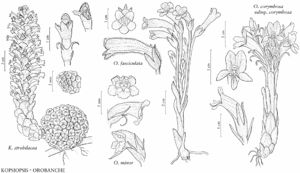Kopsiopsis strobilacea
in H. G. A. Engler, Pflanzenr. 96[IV,261]: 306. 1930.
Tuberlike bases 25–55(–90) mm diam., surface coarsely tessellate. Stems dark red-brown or purple, sometimes yellow, (100–)140–260(–300) mm, stout, 10–30 mm diam. Leaves imbricate; blade lanceolate, ovate, or broadly triangular, 7–12 × 7–15 mm, margins entire, sometimes ± erose, apex obtuse. Inflorescences compact or open racemes, 2–5 cm diam.; bracts spreading, dark purple or yellow, spatulate or broadly oblanceolate, 8–17(–20) × 8–15(–19) mm, margins entire or ± erose, frequently white-translucent or lavender, apex obtuse or truncate, rolled adaxially. Pedicels 0–1.5(–3.5) mm; bracteoles 0–2. Flowers dark purple, sometimes yellow, 15–20 mm; calyx cup 1–3 mm deep, lobes sometimes deciduous, 0–5, attenuate to filiform, equal to or shorter than cup; corolla lobe margins white, lavender, or pinkish, glabrous, sometimes ciliate, abaxial lip as long as or slightly shorter than adaxial lip, lobes 3–5 mm, apex acute, obtuse, or rounded, adaxial lip margins inrolled; filaments with tuft of hair at base, sparsely villous distally, anthers villous, ± exserted, base mucronulate, sterile appendage (connective) minute or absent; style equal to or shorter than stamens; stigma capitate or 2–4-lobed; carpels 4; placentae (3 or)4. Capsules (3 or)4-valved. Seeds 2–3 mm.
Phenology: Flowering Apr–Jul.
Habitat: Coastal mountains, open woodlands, chaparral, dry forests with Arbutus and Arctostaphylos.
Elevation: 300–3000 m.
Distribution
Calif., Oreg., Mexico (Baja California).
Discussion
Kopsiopsis strobilacea is parasitic on Arbutus menziesii and inland species of Arctostaphylos. Some populations in Marin, Siskiyou, and Trinity counties, California, and Jackson and Josephine counties, Oregon, where the ranges of the two species would allow contact, present characters intermediate with K. hookeri. The intermediate conditions observed were corolla lobes more or less ciliate versus glabrous and floral bracts narrower (almost lanceolate versus spatulate); intermediate specimens examined are at CAS, GH, NY, ORE, OSC, and RSA. Although the two species are almost completely allopatric, morphological evidence points to the possibility that some genetic exchange has occurred between the two species. The intermediate conditions were observed only in individuals within populations of K. strobilacea in the northern portion of the geographical range. No intermediate characters were observed in K. hookeri.
Selected References
None.
